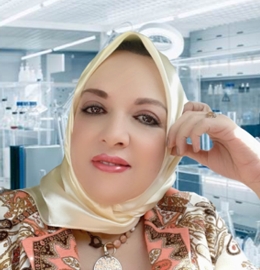
Dr. Nawal Boukli
Institution: Universidad Central del Caribe
Email: nboukli@uccaribe.edu
Gp12O Promotes ER Stress Response and Chemotherapy Resistance.
HIV-1 infected patients are more prone to developing cancers, including glioblastomas (GBM). This indicates that HIV infection is associated with more aggressive tumor behavior and treatment resistance. The underlying molecular mechanism of the GBM-HIV association is still unknown. Our long-term goal is to develop improved treatment methods for HIV-infected glioma patients, taking into consideration the regulatory role of HIV on tumor progression and responsiveness to treatment. Our hypothesis will be tested in the following aims: Specific Aim 1: To validate the hypothesis that gp120 promotes glioma cell proliferation through ER stress activation. Expression levels and activity of endoplasmic reticulum (ER) stress markers and their relation to proliferation rates of glioma cells and tumor growth will be experimentally tested in vitro and in vivo, in response to gp120 exposure. Viability and flow cytometry cell cycle analysis, western blot and metabolomics approaches will be used to verify if exposure to gp120 stimulates proliferation in primary glioma cells. The effect of gp120 on tumor growth and activity of glycolysis in vivo will be evaluated in transgenic tGFAP/gp120 mouse model, as well as via intracranial human glioma implantation in nude mice and local intumor delivery of gp120. Specific Aim 2: To identify and validate ER stress/unfolded protein response (UPR) mechanisms in glioma cells leading to the development of resistance to chemotherapy. The levels of the endoplasmic reticulum chaperones and other UPR components will be examined in human primary glioma cells treated with gp120, using quantitative proteomics, Western immunoblots, and RT-P CR. Clonogenicity and proliferation studies will be performed to link protein expression to cell survival. Pharmacological blockers will be used to evaluate the role of ER stress/UPR proteins in gp120-induced chemoresistance and enhanced metabolism. To dissect the signaling pathways leading to ER stress/UPR activation in glioma cells in response to gp120 treatment. Western blot and immunocytochemistry will be used to identify gp120 binding capacity of CXCR4/CCR5 in glioma tissues and primary glioma cells. Pharmacological blockers will be used to identify if CXCR4/CCR5 cause activation of AKT pathway in gliomas leading to activation of glycolysis and UPR stress responses. This project falls within the scope of the PR-INBRE Neuroscience, Molecular Medicine/Genomics thematic area to develop therapeutics in diseases affecting our population. The research team conveys the unique and necessary expertise to ensure the successful fulfillment of this project.
